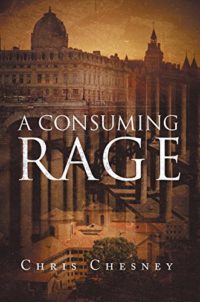Title: A Consuming Rage
Author: Chris Chesney
Publisher: Westwood Books Publishing, LLC
ISBN: 978-1643140100
Pages: 307
Genre: Non-Fiction/Crime/Finance
Interviewed by: Anthony Avina
Interview Questions For Author Chris Chesney
Today we are talking to Chris Chesney author of “A Consuming Rage.”
HBR: Tell us a little about yourself.
Qualifying as a Chartered Accountant in 1974, Chris Chesney then moved into finance and banking. He mostly worked outside the UK, retiring back there in 2000 aged 57 when, to avoid boredom, he formed his own consultancy company. An Italian client turned out to be an imaginative fraudster, to a degree that Chris only discovered when he was arrested in Paris in 2009 under an EAW issued by the Tribunale di Roma. Spending almost 5 months in prisons in France in Italy, he returned home in October to commence a new career as an author.
HBR: For those who have yet to read your book, how would you describe the book itself?
A critique, albeit with hindsight, someone ironic, of the judicial systems awaiting the unwary within the European Union plus, whilst an indication as to the close on impossibility of escape therefrom for the most vulnerable methods of our societies, of the humour and goodwill that can be found in such situations.
HBR: What would you say was your biggest motivation for getting your story out to the world?
Sticking it to the bloody Italian establishment and incompetent judiciary system.
HBR: What do you hope readers can learn from your experiences?
Never entering into business with an Italian unless you have a water-tight legal agreement governed by and construed in your own country and its courts; and never agreeing to become a director or any other officer of an Italian company.
HBR: Are there any experiences from your time in either France or Italy that you left out of the book but wish you’d included?
There were plenty of other experiences but they would be mostly semi-repetitive, so would not have added anything to the narrative.
HBR: What is the biggest piece of advice you could give to anyone falsely accused or imprisoned that you learned from your own time in both French and Italian prisons?
Ensure that, if you are involved in any kind of business in these (or probably any other foreign countries), you make sure you appoint, up front, a first class local commercial lawyer who speaks good English and who is hungry for work.
HBR: What’s next for you? What are your plans after having written this amazing book?
Whilst it has taken the best part of 10 years to find a publisher for this book, in many ways that didn’t matter. Before Westwood Books so kindly agreed to do so, I’d reached the point where if it never became public, I didn’t really care, it would not be the end of the world; my family and friends had already been provided with copies of my manuscript. However, not only was writing this book extremely cathartic, but I found the need to carefully word and structure its contents extremely pleasurable. Its contents couldn’t just consist of a series of dry, diary entries, it had to flow. So, although I am still continuing with my other business interests, I have devoted an increasing amount of my time to writing other books, based upon the many and varied, unexpected events I have so far experienced in my life. To date, I have written two more and am about half-way through a third and the first of these, “Tales of Travelling and Working Abroad”, is currently being processed for publication by my friends at Westwood Books.
HBR: Any parting thoughts or words of wisdom to share with readers?
Never allow what can appear to be bad, life-demeaning experiences overly depress you; there’s always a silver lining although it has to be stressed you have to work hard at it – things won’t get better by themselves.

